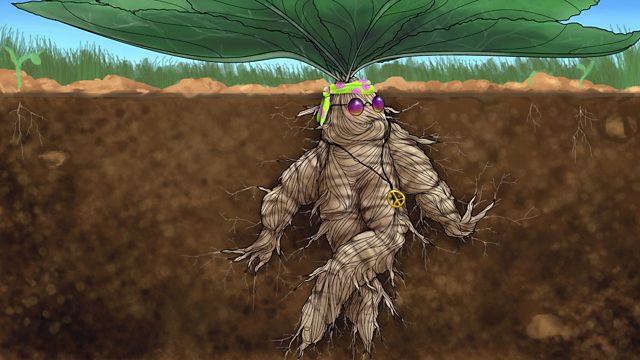Nightshades
Brett Westwood explores a group of plants that have entered our culture through food, medicine, drugs and love. From 2015
It is hard to think of a more diverse and wonderful group of plants. They enchant us, poison us, make us feel sexy, give us hallucinations, heal us and feed us. The screaming mandrakes in Harry Potter and the shamanistic dreams of tribal elders eating giant trumpet flowers testify to the magical powers of this group. Its culinary properties enhance the ever intricate flavours of modern cuisine while its fatal attractions have been used by murderers.
This is the group that contains mandrake, potatoes, chillies, aubergines, deadly nightshade and tomatoes. These are the plants that have entered our culture through food and medicine, drugs and love.
Fearing anything that looked like nightshade the first plants that were brought here from the New World were regarded with suspicion, yet quickly we adopted them, so much so that it is impossible to conceive of Italian food without tomatoes or Friday night fish and chips, yet they are aliens in a strange land. We have a lot to thank this group for.
It soothed us before anaesthetics, sent our imaginations flying and tempted us with alluring flavours – and they are still pushing the frontiers of both medicine and food today.
First Broadcast in a longer form : 14th July 2015
Original Producer : Sarah Pitt
Archive Producer for BBC Audio : Andrew Dawes
Last on
![]()
Meet the nightshade family
Nine facts about screaming roots, poisonous infusions and flying witches.
![]()
The World According to Mandrake
Natural Histories comedy with Shaun Keaveny.
![]()
The plant that can kill and cure
Producer Mary Colwell writes about the diverse nightshade family.
Clips
-
![]()
Why mandrakes were drawn as people
Duration: 01:09
-
![]()
The myth of the mandrake scream
Duration: 01:17
-
![]()
The World According to Mandrake
Duration: 01:18
Dr Sandy Knapp

She began working at the Natural History Museum in 1992 and has described more than 75 new species of plants. She is the author of several popular books on the history of science and botanical exploration, including the award-winning Potted Histories.
In 2009 she was honoured by the Peter Raven Outreach Award by the American Society of Plant Taxonomists and the UK National Biodiversity Network’s John Burnett Medal.
Xanthe Clay

Back in the UK, she worked as a bookseller specialising in cookery books, and when the bookshop chain folded she spent her redundancy money training to be a chef. She worked as a chef and caterer in the West Country before starting the Readers’ Recipe column for The Telegraph. Since then she has worked on both food and cookery features for Weekend Telegraph.
Twitter: @xantheclay
Joyce Frome

She is also author of Wicked Enchantments: A History of the Pendle Witches and Their Magic.
Professor Michael Heinrich

Professor Heinrich has many years of research experience in a multitude of transdisciplinary aspects of medicinal and food plant research, as well as at the interface of cultural and natural sciences. He is Editor in Chief of Frontiers in Ethnopharmacology as well as Reviews Editor of the Journal of Ethnopharmacology.
Andrew Smith

He serves as the editor for the “Edible Series” and the “Food Controversies Series” at Reaktion Books.
Twitter: @tomato1946
Alain Touwaide

Broadcasts
- Tue 14 Jul 2015 11:00BBC Radio 4
- Mon 20 Jul 2015 21:00BBC Radio 4
- Sun 10 Apr 2022 06:35BBC Radio 4










